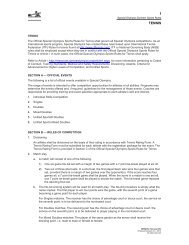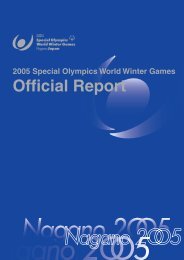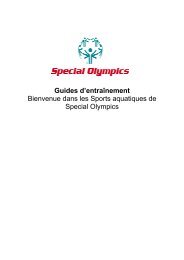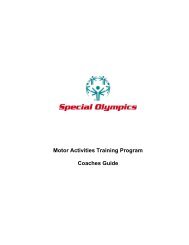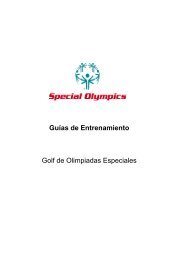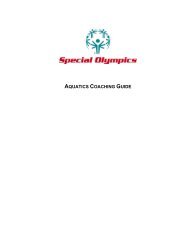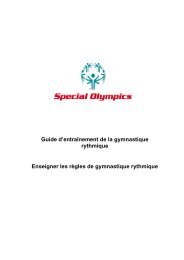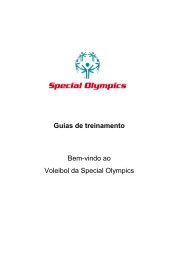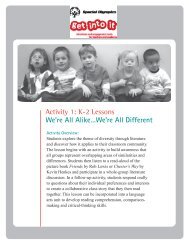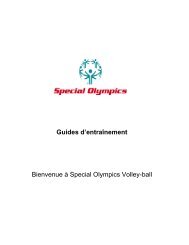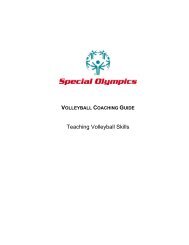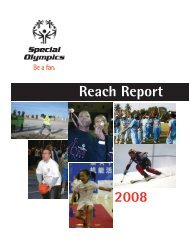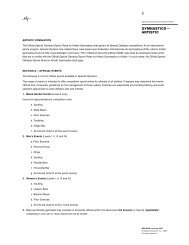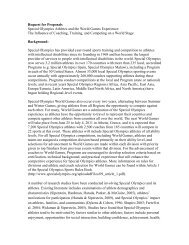BADMINTON Special Olympics Sports Skills Program
BADMINTON Special Olympics Sports Skills Program
BADMINTON Special Olympics Sports Skills Program
You also want an ePaper? Increase the reach of your titles
YUMPU automatically turns print PDFs into web optimized ePapers that Google loves.
18. Although <strong>Special</strong> <strong>Olympics</strong> is primarily and essentially<br />
a program of sports training and competition, efforts are<br />
made to offer or to cooperate with others who offer, as<br />
an integral part of <strong>Special</strong> <strong>Olympics</strong> Games, a full range<br />
of artistic, social, and cultural experiences such as dances,<br />
a rt exhibits, concerts, visits to historic sites, clinics, theatrical<br />
and motion picture performances, and similar activ i t i e s .<br />
19. In some countries with newly created <strong>Special</strong> <strong>Olympics</strong><br />
<strong>Program</strong>s it may not be possible, due to economic or<br />
other circumstances, to organize nationwide Games.<br />
In this case, SOI may authorize such programs to focus<br />
on area or Regional Games with the goal of increasing<br />
public awareness of the capabilities of individuals with<br />
intellectual disabilities.<br />
20. All <strong>Special</strong> <strong>Olympics</strong> training and competitions must<br />
be conducted under the auspices of an organization<br />
specifically accredited and sanctioned by SOI to conduct<br />
<strong>Special</strong> <strong>Olympics</strong> <strong>Program</strong>s.<br />
2 1 . To the greatest extent possible, <strong>Special</strong> <strong>Olympics</strong> activ i t i e s<br />
should be organized by and invo l ve local volunteers, from<br />
school- and college-age individuals to senior citizens, from<br />
c ivic clubs to businesses, to create greater opport u n i t i e s<br />
for public understanding of and participation with people<br />
with intellectual disabilities.<br />
22. The families of <strong>Special</strong> <strong>Olympics</strong> athletes are encouraged<br />
to play an active role in their community <strong>Special</strong> Oly m p i c s<br />
<strong>Program</strong>, to share in the training of their athletes, and to<br />
assist in the public education effort needed to create<br />
greater understanding of the emotional, physical, social,<br />
and spiritual needs of people with intellectual disabilities<br />
and their families.<br />
2 3 . <strong>Special</strong> <strong>Olympics</strong> recognizes the contributions and encourages<br />
the participation of other organizations such as<br />
schools, parks, and recreational departments, institutions<br />
caring for the mentally handicapped, and independent<br />
l iving centers that conduct sports training for indiv i d u a l s<br />
with intellectual disabilities. Accredited <strong>Special</strong> <strong>Olympics</strong><br />
<strong>Program</strong>s should encourage such organizations to train<br />
athletes in accordance with <strong>Special</strong> <strong>Olympics</strong> rules to<br />
facilitate the athletes’participation in <strong>Special</strong> <strong>Olympics</strong><br />
competitions.<br />
<strong>Special</strong> <strong>Olympics</strong> Badminton <strong>Sports</strong> <strong>Skills</strong> <strong>Program</strong><br />
Eligibility for Participation<br />
in <strong>Special</strong> <strong>Olympics</strong><br />
<strong>Special</strong> <strong>Olympics</strong> trainings and competitions are open to<br />
every person with intellectual disabilities who is at least<br />
eight years of age and who registers to participate in<br />
<strong>Special</strong> <strong>Olympics</strong> as required by the General Rules.<br />
There is no maximum age limitation for participation in<br />
<strong>Special</strong> <strong>Olympics</strong>. The minimum age requirement for part i c i -<br />
pation in <strong>Special</strong> <strong>Olympics</strong> is at least eight years of age. A n<br />
Accredited <strong>Program</strong> may permit children who are at least five<br />
years old to participate in age-appropriate <strong>Special</strong> Oly m p i c s<br />
training programs offered by that Accredited <strong>Program</strong>, or in<br />
s p e c i fic (and age-appropriate) cultural or social activ i t i e s<br />
o ffered during the course of a <strong>Special</strong> <strong>Olympics</strong> event. Such<br />
children may be recognized for their participation in such<br />
training or other noncompetitive activities through cert i fi c a t e s<br />
of participation or through other types of recog n i t i o n<br />
a p p r oved by SOI that are not associated with participation in<br />
<strong>Special</strong> <strong>Olympics</strong> competition. Howeve r, no child may<br />
p a rticipate in a <strong>Special</strong> <strong>Olympics</strong> competition (or be awa r d e d<br />
medals or ribbons associated with competition) before his or<br />
her eighth birt h d ay.<br />
Participation in <strong>Special</strong> <strong>Olympics</strong> training and competition<br />
is open to all persons with intellectual disabilities who meet<br />
the age requirements, regardless of the level or gdegree<br />
of that<br />
person’s disability, and whether or not that person also has<br />
other mental or physical disabilities, so long as that person<br />
registers to participate in <strong>Special</strong> <strong>Olympics</strong> as required by<br />
the General Rules.<br />
A person is considered to have intellectual disabilities for<br />
purposes of determining his or her eligibility to participate<br />
in <strong>Special</strong> <strong>Olympics</strong> if that person satisfies any one of the<br />
following requirements:<br />
1. Has been identified by an agency or professional as<br />
having intellectual disabilities as determined locally; OR<br />
2. Has cognitive delay, as determined by standardized<br />
measures such as intelligence quotient or IQ testing or<br />
other measures that are generally accepted within the<br />
professional community in that Accredited <strong>Program</strong>’s<br />
nation as being a reliable measurement of the existence<br />
of a cognitive delay; OR<br />
3. Has a closely related developmental disability. A “ c l o s e ly<br />
related developmental disability” means having functional<br />
limitations in both general learning (such as IQ) and in<br />
adaptive skills (such as recreation, work, independent<br />
l iving, self-direction, or self-care). Howeve r, persons whose<br />
functional limitations are based solely on a physical,<br />
behavioral, or emotional disability, or a specific learning<br />
or sensory disability, are not eligible to participate as <strong>Special</strong><br />
<strong>Olympics</strong> athletes. These individuals may be eligible to<br />
9



